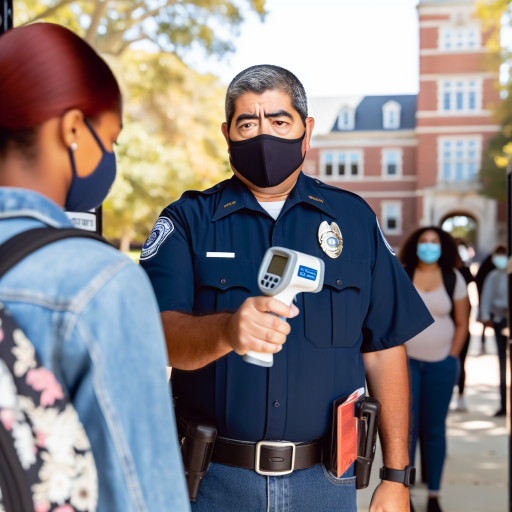Introduction:
Parole officers play a vital role in the criminal justice system.
Their work involves supervising and assisting offenders who have been released from prison on parole.
Their efforts are essential in ensuring public safety.
They also facilitate the reintegration of individuals into society.
Duties of a Parole Officer:
- Conduct regular meetings with parolees to monitor their progress.
- Provide guidance and support to help parolees successfully transition back into society.
- Assess the risks and needs of each parolee to develop individualized supervision plans.
- Collaborate with other agencies and service providers to connect parolees with resources such as job training and housing assistance.
Importance of Parole Officers:
Parole officers serve as mentors and role models for parolees.
They help individuals navigate the challenges of reentry.
Parole officers also support parolees in making positive life choices.
Their role is crucial in reducing recidivism rates and promoting rehabilitation.
Challenges Faced by Parole Officers:
- Balancing enforcement of rules with providing support and guidance to parolees.
- Managing a large caseload of diverse individuals with varying needs and backgrounds.
- Dealing with potential safety risks and volatile situations when working with offenders.
Role in Promoting Public Safety:
Parole officers are critical to promoting public safety.
Their dedication supports the rehabilitation of offenders.
They contribute to the successful reintegration of individuals into society.
This ultimately leads to safer communities for all.
Responsibilities of a Parole Officer:
Parole officers are tasked with monitoring the activities of parolees on a regular basis.
They enforce the conditions set forth by the parole board to ensure compliance.
Providing support and guidance to help parolees reintegrate into society is a crucial aspect of their role.
Communication with parolees is essential to track their progress and address any issues that may arise.
Building a rapport with parolees can help foster trust and cooperation in the rehabilitation process.
Importance of Communication:
Regular communication helps parole officers assess the parolee’s adherence to the conditions of their release.
Effective communication allows parole officers to address any challenges or obstacles faced by the parolee in their reintegration process.
Keeping an open line of communication helps build a relationship of trust and accountability between the parole officer and the parolee.
Transform Your Career Today
Unlock a personalized career strategy that drives real results. Get tailored advice and a roadmap designed just for you.
Start NowCommunication also enables parole officers to provide resources and support to assist the parolee in meeting their goals and objectives.
Maintaining communication not only ensures the safety of the community but also helps in the successful reentry of the parolee into society.
Conducting Risk Assessments:
Parole officers conduct risk assessments using standardized tools and interviews with parolees.
They evaluate factors like criminal history, substance abuse, employment status, and community support.
These assessments help determine the likelihood of a parolee reoffending and inform supervision plans.
Based on the risk level, officers can adjust the frequency and intensity of monitoring and support.
High-risk individuals may require more frequent visits and drug testing to ensure compliance.
Medium-risk offenders might need regular check-ins and referrals to treatment programs.
Low-risk parolees may receive less supervision, focusing on maintaining positive behavior.
Parole officers also consider the parolee’s attitude, behavior during supervision, and compliance with conditions.
By tailoring supervision to individual risk levels, officers can better prevent recidivism and promote successful reintegration.
Effective risk assessment is essential to creating personalized supervision plans that address specific needs and risks.
- Parole officers conduct risk assessments using standardized tools and interviews with parolees.
- They evaluate factors like criminal history, substance abuse, employment status, and community support.
- These assessments help determine the likelihood of a parolee reoffending and inform supervision plans.
- Based on the risk level, officers can adjust the frequency and intensity of monitoring and support.
- High-risk individuals may require more frequent visits and drug testing to ensure compliance.
- Medium-risk offenders might need regular check-ins and referrals to treatment programs.
- Low-risk parolees may receive less supervision, focusing on maintaining positive behavior.
- Effective risk assessment is essential to creating personalized supervision plans that address specific needs and risks.
Discover More: Emergency Response: Role of Bomb Squad Technicians
When working with parolees, parole officers play a crucial role in developing supervision plans that are tailored to each individual’s specific needs and circumstances.
These plans are essential in helping parolees successfully reintegrate into the community.
Importance of Individualized Supervision Plans
- Parole officers assess the unique challenges and risks that each parolee faces upon release.
- By creating individualized plans, officers can address specific needs such as housing, employment, and mental health services.
- These plans are designed to help parolees avoid reoffending and ultimately lead productive, law-abiding lives.
- Individualized supervision plans also take into account the parolee’s support system and resources available in the community.
Setting Realistic Goals
- Parole officers work closely with parolees to establish achievable short-term and long-term goals.
- Setting realistic goals helps parolees stay motivated and focused on their rehabilitation and reintegration efforts.
- Officers help parolees break down larger goals into manageable steps to track progress effectively.
Monitoring Progress
- Parole officers regularly meet with parolees to monitor their progress toward their goals.
- Officers utilize various tools such as drug testing, curfew checks, and home visits to ensure compliance.
- Monitoring progress allows officers to identify any potential challenges or setbacks early on and provide necessary support.
- By tracking progress, parole officers can make adjustments to the supervision plan as needed to increase the likelihood of successful reentry.
Developing individualized supervision plans, setting realistic goals, and monitoring progress are essential components of a parole officer’s role in supporting parolees as they transition back into the community.
Through personalized attention and guidance, officers can help parolees navigate the challenges of reentry and build a brighter future.
Gain More Insights: Top Security Consulting Firms in the USA
Collaborating with Community Resources:
Parole officers play a crucial role in collaborating with community organizations.
They work with treatment providers, social services, and other stakeholders.
Transform Your Career Today
Unlock a personalized career strategy that drives real results. Get tailored advice and a roadmap designed just for you.
Start NowThis collaboration is vital in supporting the rehabilitative efforts of parolees.
Connecting parolees with resources helps address their education, employment, and housing needs.
Parole officers also focus on mental health services to ensure holistic support.
Importance of Community Connections:
- Community resources offer parolees the necessary tools for successful reintegration.
- Access to education and vocational training enhances their employability.
- Stable housing options reduce the risk of recidivism among parolees.
- Connecting parolees with mental health services improves overall well-being and reduces reoffending.
- Employment services help parolees secure jobs and become self-sufficient members of society.
Building Strong Partnerships:
- Parole officers establish partnerships with community organizations to create a supportive network.
- Collaboration with treatment providers ensures parolees receive necessary therapy and support.
- Working with social services helps address any basic needs parolees may have.
- Engaging with employers can lead to job opportunities for parolees looking to reenter the workforce.
- Partnerships with housing agencies secure stable living arrangements for parolees.
You Might Also Like: The Role of Campus Security in Crisis Management
Providing Counseling and Support:
Parole officers offer counseling to address underlying issues contributing to criminal behavior.
They promote positive behavior change and help parolees develop pro-social skills.
Parole officers play a crucial role in the rehabilitation and reintegration of individuals who have been released from prison on parole.
In addition to monitoring their parolees’ compliance with the terms of their release, parole officers also provide counseling and support to help address underlying issues that may contribute to criminal behavior.
One of the main responsibilities of a parole officer is to work closely with their parolees to identify any personal or social factors that may have led to their involvement in criminal activities.
By offering counseling services, parole officers can help parolees gain a better understanding of the root causes of their behavior and develop strategies to address and overcome these issues.
Furthermore, parole officers play a key role in promoting positive behavior change among their parolees.
By establishing a trusting and supportive relationship, parole officers can encourage and motivate parolees to make the necessary changes to lead a law-abiding life.
This includes helping them develop pro-social skills, such as anger management, conflict resolution, and decision-making, to help them successfully reintegrate into society.
Through regular meetings and check-ins, parole officers provide parolees with a safe space to discuss their challenges, fears, and successes.
This open line of communication allows parole officers to offer guidance, support, and resources to help parolees navigate their transition back into the community.
The counseling and support provided by parole officers are essential components of the reentry process.
They not only help address the individual needs of parolees but also contribute to reducing recidivism rates and promoting public safety.
Find Out More: Protective Services: Role of U.S. Marshals

Monitoring Compliance with Conditions:
Parole officers conduct regular checks on parolees to ensure they are following the conditions set.
Drug testing is a common method used to monitor parolees for substance abuse.
Transform Your Career Today
Unlock a personalized career strategy that drives real results. Get tailored advice and a roadmap designed just for you.
Start NowParole officers also enforce curfews to ensure that parolees are at home during specified times.
Reporting requirements mandate that parolees keep their officers informed of their whereabouts.
Consequences for Non-Compliance:
Parolees who fail to meet the conditions of their parole may face consequences.
Consequences could include increased supervision, electronic monitoring, or even revocation of parole.
Parole officers must address violations promptly, using appropriate measures to ensure compliance.
Violations are taken seriously as they can impact the safety of the community and the success of the individual.
Assessing Progress and Adjusting Plans
Parole officers play a crucial role in monitoring the progress of their parolees to ensure compliance with the conditions of their release.
Here is how they assess progress and adjust plans:
- Regular Assessment: Parole officers regularly meet with their parolees to review their progress on meeting goals and abiding by the conditions of parole.
- Monitoring Behavior: They observe the behavior of the parolees and gather information from various sources, including employers, family members, and treatment providers.
- Reviewing Reports: Parole officers review progress reports, drug test results, and attendance records from counseling or treatment programs to evaluate performance.
Importance of Ongoing Communication
Effective communication is vital in the relationship between a parole officer and a parolee.
It helps in fostering trust and ensuring the success of the reintegration process.
Here are the reasons why ongoing communication is crucial:
- Building Trust: By maintaining open and honest communication, parole officers can build trust with their parolees, which is essential for compliance.
- Addressing Issues: Regular communication allows parole officers to address any issues or concerns that may arise promptly, preventing escalation.
- Providing Support: Parole officers offer guidance and support to help their parolees navigate challenges and make positive changes in their lives.
Collaboration for Reintegration
Collaboration between parole officers, parolees, and other stakeholders is essential for successful reintegration and reducing the risk of recidivism.
Here is how collaboration supports these goals:
- Engaging Support Systems: Parole officers work with parolees to engage their support systems, such as family, friends, and community resources, to provide additional support.
- Coordinating Services: They collaborate with treatment providers, mental health professionals, and employment services to ensure parolees receive the necessary services for successful reintegration.
- Encouraging Accountability: By fostering a collaborative environment, parole officers encourage parolees to take responsibility for their actions and adhere to the conditions of their parole.
Key Roles and Responsibilities
A parole officer supervises and supports individuals released from prison.
They monitor their compliance with parole conditions.
They provide resources for successful reintegration into society.
Parole officers conduct home visits and drug tests to ensure compliance.
They collaborate with other professionals to address offender needs.
They also provide counseling and referrals to services.
Impact on Public Safety
Parole officers play a crucial role in promoting public safety.
Transform Your Career Today
Unlock a personalized career strategy that drives real results. Get tailored advice and a roadmap designed just for you.
Start NowThey monitor and manage high-risk offenders to prevent reoffending.
By enforcing parole conditions, they hold offenders accountable for their actions.
They provide guidance and support to help individuals make positive choices.
Their intervention reduces the likelihood of individuals returning to criminal behavior.
Reintegration into Society
Parole officers help individuals transition back into the community.
They assist with finding employment, housing, and other resources.
By offering support and guidance, they help individuals become productive members of society.
Their role is essential in reducing recidivism rates and promoting rehabilitation.
Parole officers have a significant impact on the criminal justice system.
They promote public safety by supervising offenders and ensuring compliance.
They also play a vital role in helping individuals successfully reintegrate into society after incarceration.
Parole officers are key players in facilitating positive outcomes for both offenders and communities.
Additional Resources
First responder eligibility – ID.me Help Center
Police and Detectives : Occupational Outlook Handbook: : U.S. …
[E-Books for Sale]
The Big Book of 500 High-Paying Jobs in America: Unlock Your Earning Potential
$19.99 • 500 High-Paying Jobs • 330 pages
Explore 500 high-paying jobs in America and learn how to boost your career, earn more, and achieve success!
See All 500 High-Paying Jobs of this E-Book
1001 Professions Without a Degree: High-Paying American Jobs You Can Start Now
$19.99 • 1001 Professions Without a Degree • 174 pages
Discover 1001 high-paying jobs without a degree! Unlock career tips, skills, and success strategies for just $19.99!




